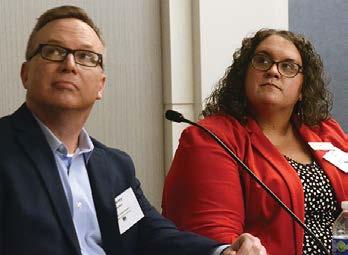
2 minute read
School lawyer: Don’t get near FOIA line
from March 2023
by ASBA
When in doubt, notify.
That was one of the messages shared by four full-time school attorneys at the ASBA School Law Seminar Feb. 7.
Participants included Bryant’s Jeremy Lassiter, Cabot’s Layla Secrest, Springdale’s Kendra Clay, and Mary Claire Hyatt from Fayetteville. Cody Kees with the Bequette, Billingsley and Kees law firm moderated, while ASBA General Counsel Jay Bequette also participated.
Much of the discussion centered around the state’s wide-ranging Freedom of Information Act, which prohibits board members from discussing school business with each other, even informally, unless the media has been notified.
Lassiter advised erring on the side of caution. At Bryant, if more than one board member will be in the same place at a special event, the media is notified.
As he explained, “I have never been one as an attorney to advise getting anywhere close to that line on FOIA. … My reason for that is once you are determined to have been a school district or an administration that has violated FOIA, it’s going to be very hard for you to get that reputation back, number one, and then number two, you become a target. So, one person says you violate FOIA, you’re going to get pressed by other people as well, so it’s always good to just stay well away from that line, be as transparent as you can under the law, and then let somebody else get sued.”
Kees noted that state law requires all officially scheduled, special and called open meetings to be recorded. Does that include work sessions? Cabot only records the public board meeting, while Fayetteville this year began recording work sessions. Hyatt said all Fayetteville meetings are recorded.
The attorneys said board members’ emails and texts – even coming from their private phone – are a public record subject to FOIA if they relate to school business. Kees recommended avoiding creating those public records unnecessarily. Hyatt said attendees shouldn’t put anything in writing they wouldn’t want to appear in the newspaper.

The attorneys said they spend a lot of time on FOIA requests. Clay said the last three weeks she had spent 95% of her time on one request from an opposing counsel who wanted a large number of documents that had to be heavily redacted. Hyatt said this year she had reviewed more than 40,000 pages.
Lassiter said over time he has changed his reaction to FOIA. He said the public has a right to know how its money is being spent. His focus has been on improving the district’s records retention policies and on training staff on the law’s requirements. That way, the district can respond effectively when it receives a request.
On a question about handling public comment periods, Hyatt said boards that choose to have them should have clear boundaries regarding how long people can talk and how long the public comment periods will last. Guidelines should be read aloud before comments are made, and then they must be applied consistently. Clay said board members shouldn’t engage the public despite the natural inclination to correct misinformation. Lassiter said boards should plan beforehand how they will handle a meeting that becomes contentious, not react in the moment.
Kees closed the seminar by asking the attorneys to give advice to help districts avoid litigation. Secrest said they should do the right thing and also ask for help when needed. Clay likewise advised doing “what’s right for kids every time.” Hyatt advised trusting the school district staff. Lassiter said that, ultimately, a school board member will get sued if they stay in office long enough.
“The issue is being in the best possible position to win when you are sued, so I think that’s where the training comes in,” he said. “Go to the training. Don’t be afraid of being sued because when that lawsuit comes as it inevitably will, you’re going to be in the best position to defend against that.”










